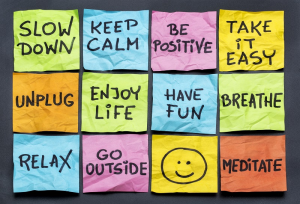 4 Easy Ways to Minimize Holiday Stress by Jamie Blum, LCSW-C
4 Easy Ways to Minimize Holiday Stress by Jamie Blum, LCSW-C
As the weather gets colder and obligations pile up, resist the tendency to retreat from your responsibilities; at least is what I talk to my clients about during this time of the year. By recognizing on how retreating can trigger higher levels of anxiety and focusing on identifying easy techniques to minimize those stresses, clients often find they enjoy the season and have more success at work, in relationships, and in how they enjoy their lives. So, I thought I would share 4 easy techniques to minimize stressors.
Sleep: It may seem like common knowledge that sleep is essential to manage day to day activities, but I am amazed at the distractions young adults, teenagers, and parents have in getting sleep. Performance in sports, choir and other after school activities, as well as can be linked to getting enough sleep. According to one research study“…more than 87 percent of high school students in the United States get far less than the recommended eight to 10 hours, and the amount of time they sleep is decreasing — a serious threat to their health, safety and academic success. Sleep deprivation increases the likelihood teens will suffer myriad negative consequences, including an inability to concentrate, poor grades, drowsy-driving incidents, anxiety, depression, thoughts of suicide and even suicide attempts.” While demands may be high for teenagers, it is important that they find a routine not only during the day but in the evening as well. It is essential that they have all electronics put away as well as a quiet space to sleep. This may mean different things to different families – some families reserve the bedroom for rest and do homework and keep electronics in shared spaces. What works for you may be unique to you, but sticking to a routine and getting enough sleep is something that everyone will benefit from in the long term.
Drink water: When talking with my client’s about hydration, I usually get the same response, “ I hate the taste of water.” They are then surprised when I tell them that the average person needs between 1.5 and 2 liters of water a day to stay hydrated and lack of hydration can impact mental health and motivation to complete tasks. With all the expectations on adolescents today, staying hydrated with water is a simple technique to minimize stress and increase productivity. This may include carrying a water bottle with you (if you are able to do so), make sure to drink water at all meals and find time to drink water even if you find that you are not thirsty. Here is an article from SELF magazine with some good tips on “How to Drink More Water.” The bottom line is to find something that works for you and stay hydrated.
Exercise: While gym class and outside sports is a requirement in most schools, I have observed that most kids would prefer to be spending time sitting and playing video games rather then taking time to exercise. When talking about the need for exercise, I try to focus on two areas. The first is the benefits of producing endorphins and the second being the social aspect of exercise. For my clients, who struggle with anxiety and depression, however, finding motivation to exercise is a challenge. Some tools that I recommend include: finding a friend to exercise with,, setting small personal goals, listening to audio books while exercising, and finding ways to celebrate achievements after working out.
Eating Healthy/balanced foods: With the fast past society that we live in, it is easier to grab a snack bar or a bag of your favorite food and eat on the way. What we often forget is the impact that food has on mental health. Research has identified that simple changes to the diet, including eating more fatty fish and fewer simple carbohydrates, can dramatically impact levels of anxiety and depression. I challenge my clients is to be mindful of what they eat, find ways to consume fresh food rather than eat processed foods, minimize eating carbohydrates in the evening as well as eating at least three meals a day.
Sleep, hydration, exercise, and eating a balanced diet is a strong foundation for building mental health and resisting the winter blues and holiday stresses.
Jamie Blum, LCSW-C, is a clinician with CPE Clinic, LLC. She specializes in cognitive behavioral therapy and motivational interviewing. Ms. Blum runs DBT groups and groups that support recovering addicts. Ms Blum often works with adults struggling with anxiety, depression, and mood disorders as well as with individuals who struggle with drug addictions.
